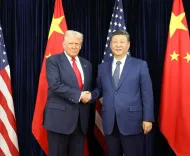Is India Effectively Addressing Perceived Risks through Robust Regulation?

Synopsis
Key Takeaways
- Institutional reforms are vital for enhancing investor confidence.
- India has established independent regulators and transparent processes.
- Strong domestic financial markets support investment.
- Private capital mobilization needs to be increased.
- India's renewable energy transformation is a key focus area.
Seville (Spain), June 30 (NationPress) Addressing perceived risks through institutional reforms is vital for emerging economies (EMs). India has tackled this challenge by creating independent regulators, implementing transparent bidding processes, standardizing contracts, and enhancing the ease of doing business, stated Finance Minister Nirmala Sitharaman here on Monday.
At the International Business Forum Leadership Summit on "From FFD4 Outcome to Implementation: Unlocking the Potential of Private Capital for Sustainable Development", the Finance Minister highlighted that these reforms have significantly boosted investor confidence and minimized transaction costs throughout the nation.
Emerging economies frequently grapple with high risk perceptions, which escalate financing costs and discourage investment.
"Robust domestic financial markets are the backbone of investment. India has made substantial investments in fortifying its banking system and expanding capital markets to finance infrastructure and industry comprehensively," she remarked during the event.
"Our regulatory frameworks have evolved to meet market demands—balancing investor protection with innovation and flexibility—creating a more favorable environment for long-term investments," added Sitharaman.
She further noted that in recent years, "we have seen promising growth in private investment, supported by the emergence of innovative financial instruments alongside traditional sources of funding."
Nonetheless, mobilization of private capital remains significantly below what is essential, with low and middle-income countries receiving an unfairly small share.
"This highlights the pressing need for targeted efforts to dismantle investment barriers and better align financial flows with development objectives," FM Sitharaman emphasized.
Discussing India’s renewable energy transition, she remarked that the increase from 2.8 GW of installed solar capacity in 2014 to over 110 GW today "was made possible through clear national targets, streamlined procurement, and government-backed risk mitigation efforts."
"This model has attracted institutional investors, including pension and sovereign wealth funds," she elaborated at the global summit.
According to her, scaling up is crucial for anything related to technology or widespread implementation.
"Without the ability to scale, the success of technology can diminish. Whether concerning technology or welfare-related distribution, scaling up is a significant factor. India has a natural advantage because of its demographic profile, but countries must collaborate to achieve successful scaling," the Finance Minister highlighted.
On the sidelines of the Summit, Finance Minister Sitharaman was scheduled to meet with senior ministers from Germany, Peru, and New Zealand, as well as the European Investment Bank (EIB) President Nadia Calvino, according to an official statement.
The Finance Minister commenced an official visit to Spain, Portugal, and Brazil from June 30 to July 5. She is leading the Indian delegation from the Department of Economic Affairs under the Ministry of Finance.
During her visit to Lisbon, Portugal, she is anticipated to have a bilateral meeting with Portugal's Finance Minister Joaquim Miranda Sarmento, in addition to engaging with prominent investors and members of the Indian diaspora.
In Rio de Janeiro, the Finance Minister will speak at the 10th Annual Meeting of the New Development Bank (NDB) as India’s Governor, and also participate in the BRICS Finance Ministers and Central Bank Governors Meeting.










